Part one is here.
There are three types of banks in Hong Kong.
- Licensed banks can maintain current (settlement) and savings accounts, accept deposits and paychecks.
- Banks with a limited license conduct commercial banking and capital markets business and can accept deposits in excess of HK$500,000.
- Depository companies are associated with licensed banks and are involved in consumer finance, commercial lending and securities. They can accept deposits over HK$100,000 with maturities of three months or more.
Hong Kong also has a large number of foreign banks. All banks on our list are licensed banks. Banks in Hong Kong are regulated and supervised to ensure banking stability, which is a factor in the overall financial stability of the country. Below we will discuss some of the best banks in Hong Kong that provide private banking.
HSBC (The Hongkong and Shanghai Banking Corporation)
Hongkong and Shanghai Banking Corporation Limited, commonly known as HSBC, is the Hong Kong subsidiary of the multinational bank HSBC. Hong Kong’s largest bank, HSBC, has branches and offices in the Indo-Pacific region and elsewhere in the world. It is also one of three commercial banks licensed by the Hong Kong Monetary Authority to issue banknotes for the Hong Kong dollar.
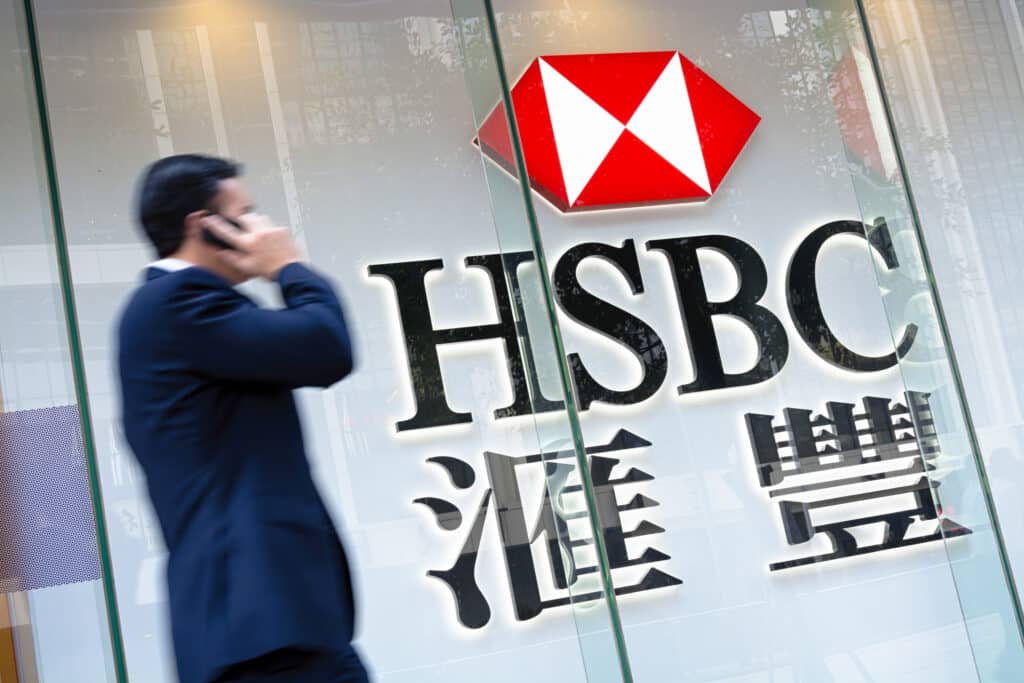
The Bank of Hong Kong and Shanghai was founded in British Hong Kong in 1865 and was incorporated as the Hong Kong and Shanghai Banking Corporation in 1866 and has been based in Hong Kong ever since (though now as a subsidiary). In 1989, it was renamed “Hong Kong and Shanghai Banking Corporation Limited”.
It is a founding member of the HSBC Group of Banks and Companies, and since 1990 has been the namesake and one of the leading subsidiaries of London-based HSBC Holdings. PLC. The company’s business ranges from traditional High Street roles in retail banking, commercial banking, corporate banking to investment banking, private banking, and global banking.
HSBC is ranked #2 in the Asian Banker ranking of banks in the Asia-Pacific region, which ranks banks based on the strength of their balance sheets.
Most recently, they reported a net income of over HK$96 billion, nearly HK$8 trillion in assets, and employ over 68,000 people.
HSBC offers a wide range of both consumer and commercial services and is the leader in business accounts in Asia. They made it to the list of the best corporate and investment banks in the Asiamoney Best Bank Award 2020 list.
They are generally the bank of choice for wealthy clients, although their minimum deposit to open a consumer account is only HK$1. They serve more than 60 countries of the world, providing their global banking services. HSBC is also often chosen by foreigners because of its global services.
Hang Seng Bank
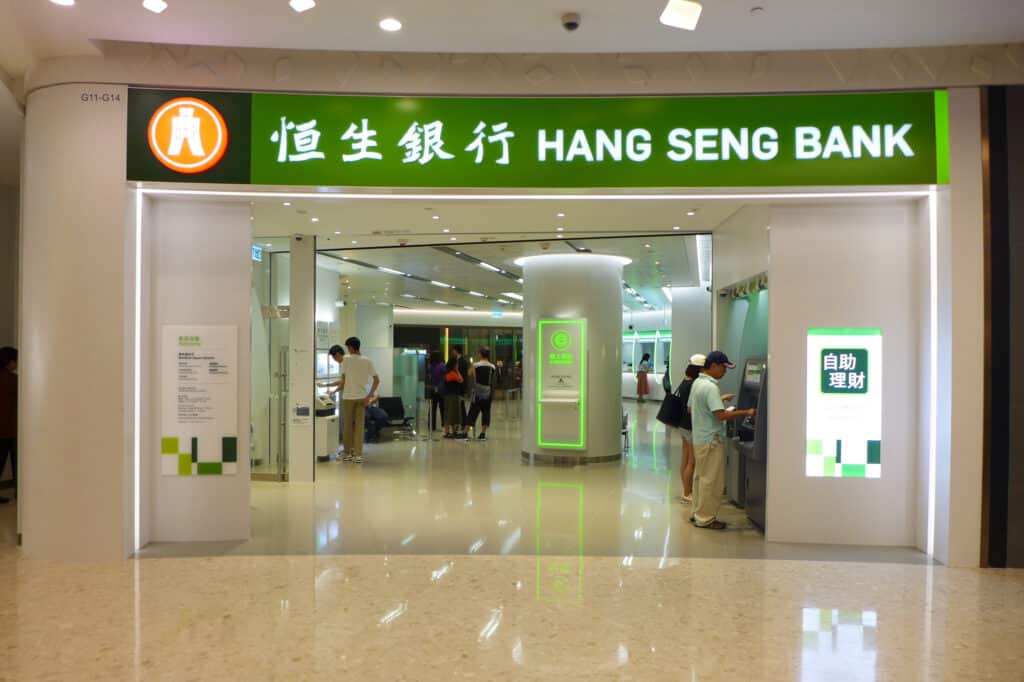
Hang Seng Bank Limited is a Hong Kong banking and financial services company headquartered in downtown Hong Kong. It is one of Hong Kong’s leading public companies in terms of market capitalization and is part of the HSBC Group, which owns a majority stake in the bank.
Hang Seng Bank is a commercial bank whose main activities include retail banking, asset management, commercial banking, treasury services, and private banking. Hang Seng Bank operates a network of about 260 service points in Hong Kong. It also has a subsidiary, Hang Seng Bank (China) Limited in mainland China, which has a network of 46 branches and subsidiaries.
In 1969, he established the Hang Seng Index as a government service, and this stock market index is now widely known as Hong Kong’s main stock market indicator.
Hang Seng Bank is a commercial bank whose main activities include retail banking and asset management, corporate and commercial banking, treasury services, and private banking. Hang Seng Bank operates a network of about 260 service points in Hong Kong. Hang Seng Bank is the only local bank that offers extensive MTR branch services to better serve its customers.
Hang Seng Bank established its subsidiary Hang Seng Bank (China) Limited in 2007. The subsidiary operates a network of 46 outlets in mainland China in Beijing, Shanghai, Guangzhou, Shenzhen, Dongguan, Fuzhou, Nanjing, Hangzhou, Ningbo, Tianjin, Kunming, Foshan, Zhongshan, Huizhou, Xiamen, Zhuhai, and Jiangmen with 12 branches and 34 branches. For wholesale foreign exchange trading, Hang Seng Bank has branches in Shenzhen, Macau, and Singapore, as well as a representative office in Taipei.
Bank of China (Hong Kong)
Bank of China (Hong Kong) Limited, also known as Bank of China (Hong Kong) or BOCHK, is a wholly-owned subsidiary of Bank of China (through Hong Kong-registered intermediate holding company BOC Hong Kong (Holdings)).

The Bank of China (Hong Kong) is the second-largest commercial banking group in Hong Kong in terms of assets and customer deposits (data for 2008) with more than 190 branches in Hong Kong as of the end of 2019. It is also one of three commercial banks licensed by the Hong Kong Monetary Authority to issue banknotes for the Hong Kong dollar.
BOCHK is legally separate from its parent company, Bank of China (BOC), although they maintain a close relationship in management and administration and cooperate in several areas, including the resale of BOC’s insurance and securities services. BOCHK is also the largest member and founder of the JETCO ATM and payment system, and the authorized clearing bank in Hong Kong for RMB (RMB/CNH) transactions.
BOCHK was established on October 1, 2001, as a result of the merger of 12 subsidiaries and associates of the Bank of China in Hong Kong and listed on the Hong Kong Stock Exchange in October 2002. As of the end of 2019, the bank’s assets were HK$3,026 billion and operating income was HK$39.8 billion. Its head office is located in the Bank of China Tower in the center of Hong Kong. The head office is shared with the Hong Kong divisions of the parent company; completed in 1988 and was the first building outside of North America to exceed 1,000 feet (300 m) in height.
Bank of China (Hong Kong) ranks 1st in the list of strong banks in the Asia-Pacific region according to Asian Banker magazine.
Their most recent reported net income was over HK$34 billion and their total assets exceed HK$3 billion. They employ more than 14,500 people.
It is the second-largest commercial banking group in Hong Kong with over 190 branches. BOC offers a full range of commercial and consumer banking services.
In 2017, they were awarded the Hong Kong Bank of the Year award by The Banker in the UK and have also received awards for the various customized services they offer. They have been named the “Best Bank for CSR (Corporate Social Responsibility) in Hong Kong” in Asiamoney’s 2020 Best Bank Awards for three consecutive years.
Citibank Hong Kong
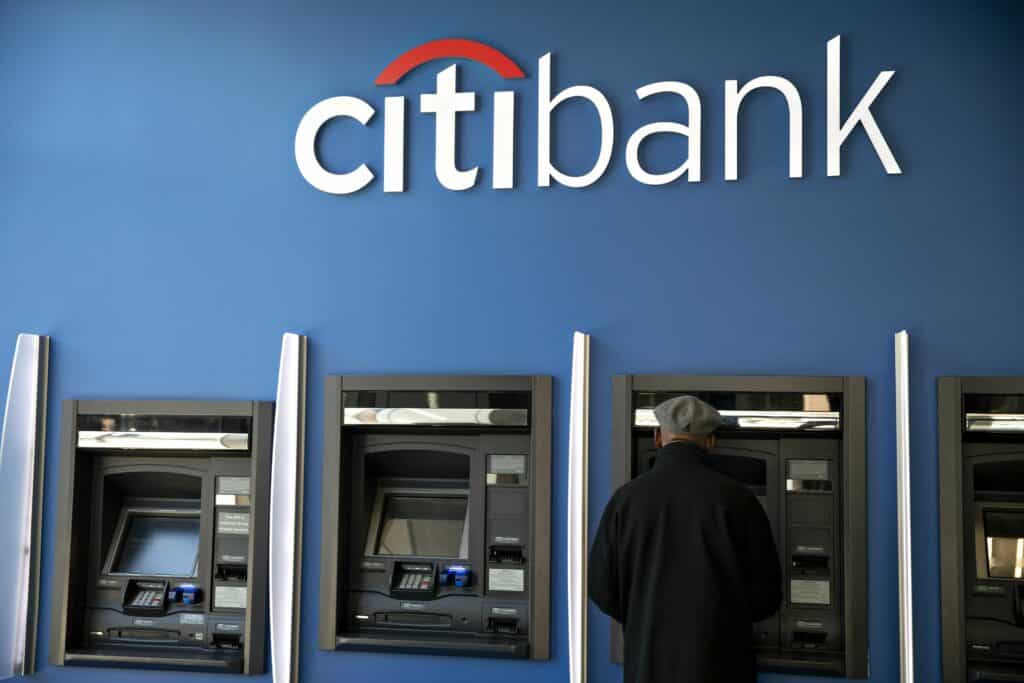
Citibank began operations in Hong Kong in 1902, thus becoming the first foreign bank to offer its services there. The bank is based on Three Garden Road in Central, formerly known as Citibank Plaza.
Citibank Hong Kong has a network of 48 branches located in Hong Kong Island, Kowloon, the New Territories, and Macau.
Citibank’s parent company, Citigroup, has three main divisions in Hong Kong: Citi Markets & Banking, Global Consumer Group, and Global Wealth management.
The Global Consumer Group operates under the Citibank brand and offers financial products and services through 25 branches, one of which is located in Macau. In addition, Citibank Hong Kong provides investment opportunities in the form of bonds, mutual funds, insurance products, foreign exchange trading, and stock trading. Through Citigold Wealth Management Banking, clients receive a customized wealth management plan. Citibank Hong Kong is also one of the largest credit card issuers in Hong Kong.
Citibank Hong Kong is ranked 37th in Asian Banker’s list of strong banks in the Asia-Pacific region. Their last reported net income was HK$3 billion and their assets are HK$224 billion.
They were the first foreign bank to offer services in Hong Kong, starting in 1902, so they have a long history in the region. They also have a strong global brand, which is one of the reasons they were chosen for our list.
They offer a full range of services for consumers and businesses and have a strong presence in the commercial and investment banking arena in Hong Kong.
Often chosen by foreigners and non-Hong Kong residents, they are one of the largest credit card issuers in the country. They offer free account packages and also have private banking services.
For two years, Citibank Hong Kong has been selected as the best global private bank by the PWM/The Banker Global Private Banking Awards.
Standard Chartered Bank Hong Kong
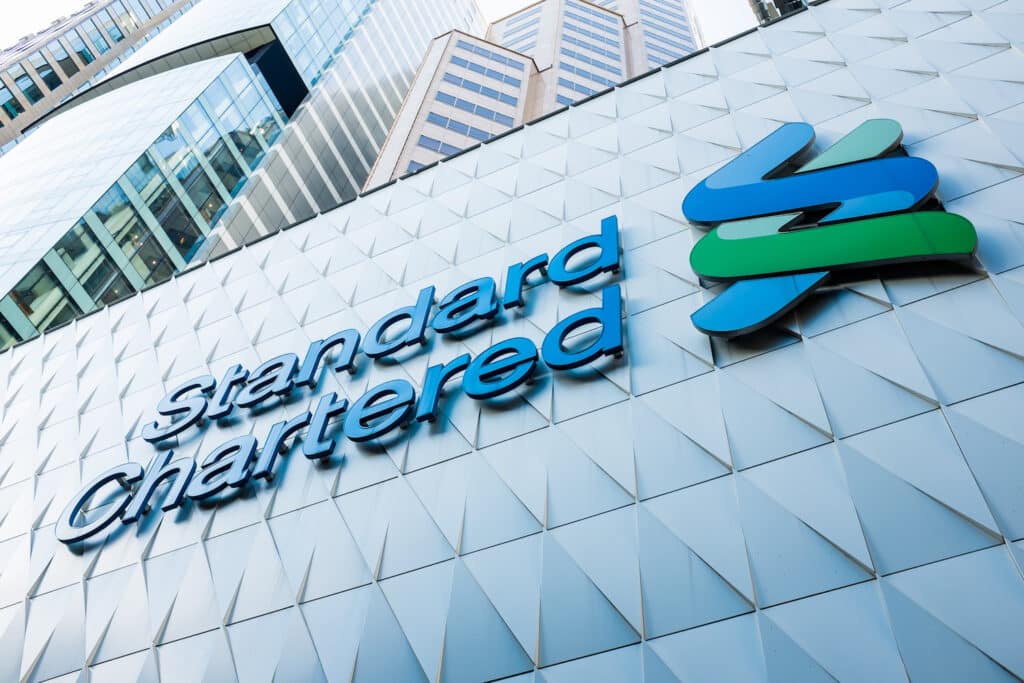
Standard Chartered Hong Kong is a licensed bank registered in Hong Kong and a subsidiary of Standard Chartered. It is also one of three commercial banks licensed by the Hong Kong Monetary Authority to issue banknotes for the Hong Kong dollar.
Standard Chartered Bank Hong Kong is ranked 3rd in the list of strong banks in the Asia-Pacific region by Asian Banker magazine. Their most recent reported net income was HK$9.7bn and their assets exceed HK$1.1bn.
It is one of only three banks in the country licensed to issue banknotes. They were founded in 2004 and do business in over 60 countries. They are unusual for the region in that they offer remote account opening. They offer a wide range of services and are a leader in the digital banking world. They have lower fees for some services to satisfy all consumers.
Standard Chartered Bank Hong Kong awards include:
- International Retail Bank of the Year by Asian Bank and Financing
- Asian Bank and Financing Digital Banking Initiative of the Year
- Asiamoney Award for Best Digital Bank in Hong Kong
BEA (Bank of East Asia)
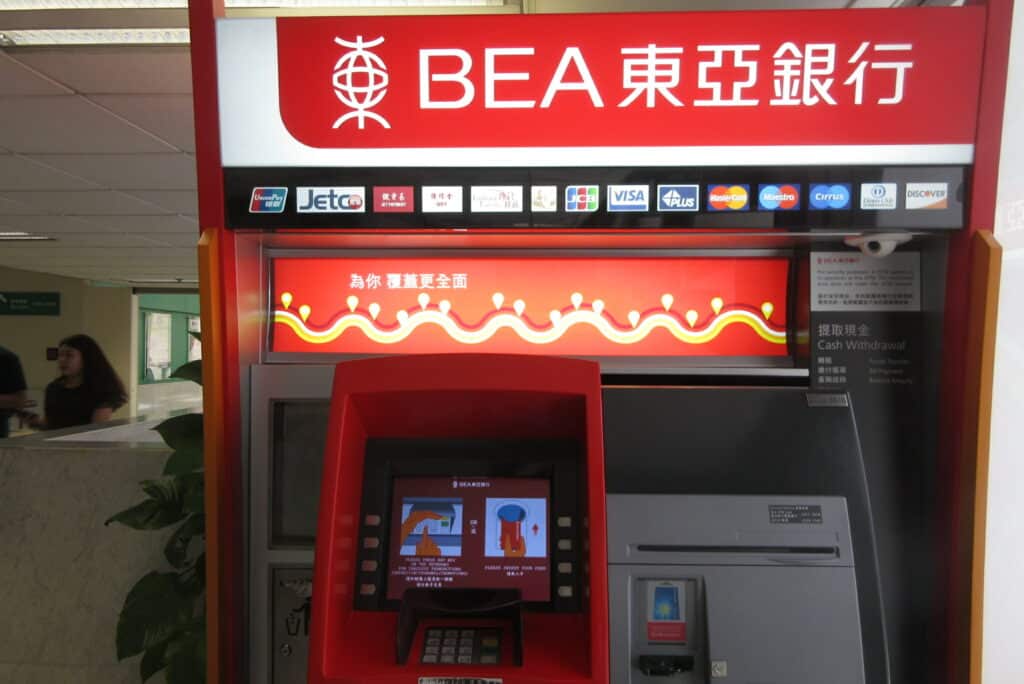
Bank of East Asia Limited is a Hong Kong-based banking and financial services company headquartered in downtown Hong Kong. It is currently the largest independent local Hong Kong bank and one of two remaining Hong Kong family banks, the other being Dah Sing Bank. It is still run by the 3rd and 4th generation of the Li family.
It was registered as a public bank in Hong Kong on November 14, 1918, and officially opened for business on January 4, 1919, by a group of local Hong Kong Chinese businessmen who “not only understood modern banking but also the needs of modern Chinese people.” business.” Essentially, it was aimed at serving the local people and businesses of Hong Kong, which were currently underserved by large British banks and small, unorganized, and often unincorporated local Hong Kong moneylenders. By the 1930s, BEA was considered the most powerful local Hong Kong bank in the city.
Like any other bank account mentioned above, BEA provides 11 different currencies for USD accounts, passbook accounts, and foreign currency deposit accounts. In addition, it includes term deposits and savings account statements.
Available currencies that BEA provides include the Australian dollar, Canadian dollar, euro, Japanese yen, New Zealand dollar, British pound, yuan, Swiss franc, South African rand, Thai baht, Singapore dollar, and US dollar.
Pained by financial indecision?

Adam is an internationally recognised author on financial matters with over 830million answer views on Quora, a widely sold book on Amazon, and a contributor on Forbes.



